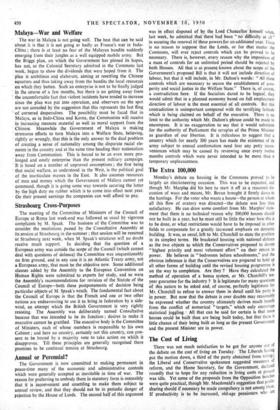Strasbourg Cross-Purposes
The meeting of the Committee of Ministers of the Council of Europe at Rome last week-end was followed as usual by vigorous complaints by M. Spaak. The business of the Committee was to consider the resolutions passed by the Consultative Assembly at its session at Strasbourg in the summer ; that session will be resumed at Strasbourg next week, when M. Spaak's strictures will no doubt receive much support. In deciding that the question of a European army was outside the scope of the Council (which cannot deal with questions of defence) the Committee was unquestionably on firm ground, and in any case it is an Atlantic Treaty army, not a European army, that must be the objective now. Some additional clauses added by the Assembly to the European Convention on Human Rights were submitted to experts for study, and so were the Assembly's recommendations for revision of the Statute of the Council of Europe—both these postponements of decision being particular objects of M. Spaak's wrath. The fundamental fact about the Council of Europe is that the French and one or two other nations are endeavouring to use it to bring in federation by a side- wind, an attempt which the British Government is very rightly resisting. The Assembly was deliberately named Consultative because that was intended to be its function ; desires to make it executive cannot be gratified. The executive body is the Committee of Ministers, each of whose members is responsible to his own Cabinet ; and here no country, certainly not this country, can
jon- sent to be bound by a majority vote to take action on which it disapproves. Till these principles are generally recognised there promises to be continual tension at Strasbourg.


















































 Previous page
Previous page